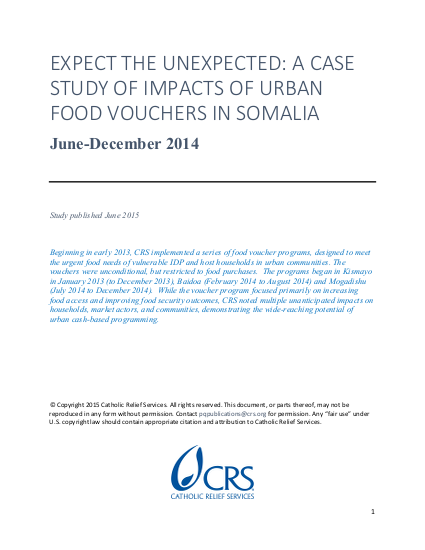
This case study reviews CRS’ food voucher programme in urban Somalia over two years. The study is intended as a resource for practitioners and others looking to learn from recent experiences in urban market-based approaches and food security, as well as a reference for those planning market-based food programming in urban or insecure environments.
Beginning in early 2013, CRS implemented a series of food voucher programmes, designed to meet the urgent food needs of vulnerable IDP and host households in urban communities. The vouchers were unconditional, but restricted to food purchases. The programmes began in Kismayo in January 2013 (to December 2013), Baidoa (February 2014 to August 2014) and Mogadishu (July 2014 to December 2014). While the voucher programme focused primarily on increasing food access and improving food security outcomes, CRS noted multiple unanticipated impacts on households, market actors, and communities, demonstrating the wide- reaching potential of urban cash-based programming.
Links
Resource collections
- Innovation
- Somalia humanitarian response
- Topics
- UN Habitat - Urban Response Collection
- Urban Response - Urban Crisis Preparedness and Risk Reduction
- Urban Response Collection - Community Engagement and Social Cohesion
- Urban Response Collection - Economic Recovery
- Urban Response Collection - Environment and Climate Change
- Urban Response Collection - Housing, Land and Property
- Urban Response Collection - Urban Crisis Response, Recovery and Reconstruction
- Urban Response Collection - Urban Resilience
